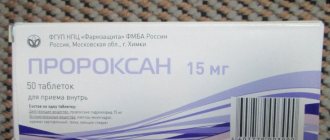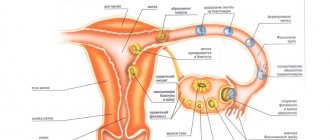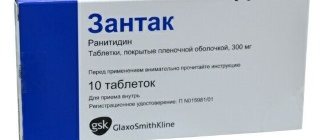Write a review
Reviews: 0
Manufacturers: Berlin-Chemie AG
Active ingredients
- Isosorbide mononitrate
Disease class
- Angina [angina pectoris]
- Previous myocardial infarction
- Congestive heart failure
Clinical and pharmacological group
- Not indicated. See instructions
Pharmacological action
- Antianginal
- Vasodilator (vasodilator)
Pharmacological group
- Nitrates and nitrate-like agents
Pharmacological properties
Pharmacodynamics
Isosorbide-5-mononitrate, the active ingredient of the drug, is the main metabolite of isosorbide dinitrate, which is widely used for the treatment and prevention of coronary heart disease (coronary heart disease).
From a pharmacodynamic point of view, isosorbide mononitrate is a peripheral vasodilator with a predominant effect on venous vessels. It stimulates the production of nitric oxide at the molecular level, which in turn activates intracellular guanylate cyclase in the vascular endothelium, which leads to an increase in the synthesis of cGMP (cyclic guanosine monophosphate), which is a mediator of vasodilation.
Isosorbide mononitrate also affects the arteries, causing a decrease in peripheral vascular resistance. Due to this, the pre- and afterload on the heart is reduced, the pumping function of the heart is improved and the need of the heart muscle for oxygen is reduced. The drug has a coronary dilating effect and redistributes coronary blood flow in ischemic areas. In patients with angina pectoris and coronary artery disease, it increases tolerance to physical activity.
By reducing blood flow to the right atrium, the pressure in the pulmonary circulation decreases. The antianginal effect occurs within 30 minutes after taking the drug orally and lasts from 2 to 6 hours.
With long-term therapy and taking high doses of isosorbide mononitrate, tolerance and cross-tolerance with other nitro compounds may develop. To prevent loss or reduction in the effectiveness of Monocinque, long-term use of the drug in large doses is not recommended.
Pharmacokinetics
After oral administration, isosorbide mononitrate is quickly and completely absorbed from the gastrointestinal tract. Bioavailability of the drug is 100% (after intravenous administration of isosorbide mononitrate and its oral administration, the concentration in the blood plasma is approximately the same). The maximum concentration is reached after 1–1.5 hours.
Monocinque is not subject to the first pass effect through the liver. Metabolism of the drug occurs in the liver. It is excreted primarily by the kidneys in the form of glucuronides and unchanged. Metabolites of isosorbide mononitrate are pharmacologically inactive. T1/2 (half-life) – about 5 hours.
Indications for use
As the main drug, Monocinque is used to prevent attacks of heart pain during angina pectoris; it is prescribed during the recovery period after myocardial infarction. In combination with other drugs, isosorbide mononitrate is recommended for chronic circulatory failure, increased pressure in the pulmonary circulation, and cor pulmonale.
Angina pectoris - indication for use of the drug Monocinque
Contraindications
Strict:
- Age up to 18 years;
- The need for simultaneous administration of phosphodiesterase inhibitors (for example, tadalafil, sildenafil or vardenafil), because they potentiate the hypotensive effect of nitrates;
- Lactase deficiency, hereditary galactose intolerance, galactose and glucose malabsorption syndrome;
- Severe anemia;
- Severe arterial hypotension (systolic blood pressure less than 90 mm Hg, diastolic blood pressure less than 60 mm Hg);
- Cardiogenic shock (if it is not possible to achieve a sufficiently high end-diastolic pressure in the left ventricle using intra-aortic counterpulsation or by administering agents that have a positive inotropic effect);
- Acute myocardial infarction, accompanied by severe arterial hypotension;
- Acute circulatory disorders (shock and vascular collapse);
- Toxic pulmonary edema;
- Hypersensitivity to the components of the drug or nitrates.
Carefully:
- Recent traumatic brain injury;
- Glaucoma;
- Liver failure;
- Severe renal failure;
- Aortic and/or mitral stenosis;
- Low filling pressure in patients with acute myocardial infarction, left ventricular failure (systolic blood pressure should not be allowed to fall below 90 mm Hg);
- Tendency to orthostatic disorders of vascular regulation;
- Pericardial tamponade, constrictive pericarditis, hypertrophic obstructive cardiomyopathy;
- Diseases accompanied by increased intracranial pressure;
- Hemorrhagic stroke;
- Thyrotoxicosis.
Side effects
- Very common (≥10%): “nitrate” headache (occurs at the beginning of treatment and usually goes away within a few days with continued treatment);
- Often (≥1% - <10%): decreased blood pressure and/or development of orthostatic hypotension (after taking the first dose and/or with subsequent dose increases), which may be accompanied by dizziness, weakness and tachycardia; from the nervous system - blurred visual perception, drowsiness, stiffness of movements, decreased speed of mental and motor reactions (especially at the beginning of treatment);
- Rarely (≥0.1% - <1%): a slight burning sensation of the tongue, nausea, facial redness, vomiting, allergic reactions, a marked decrease in blood pressure (accompanied by worsening symptoms of angina), collapsed states, sometimes accompanied by fainting and bradyarrhythmia;
- In isolated cases (<0.01%): exfoliative dermatitis.
Is it possible to develop unwanted reactions?
Reviews and instructions for use for Monocinque confirm that the drug has a truly large number of side effects on all organs.
Many patients complained of deterioration in their health in the digestive and central nervous systems. Consumers experienced abdominal pain, nausea, vomiting, and digestive problems. On the part of the central nervous system, the development of headaches, dizziness, a constant feeling of fatigue, as well as insomnia cannot be ruled out.
If there is hypersensitivity to the components of the drug, allergic reactions may begin to develop in the form of rash, hives and swelling.
The drug can also affect the female hormonal system, causing hot flashes and painful menstruation.
In very rare cases, blood pressure may drop significantly, and the development of severe heart failure may also occur.
Overdose
In case of an overdose of Monocinque, a pronounced decrease in blood pressure, headache and reflex tachycardia are observed. The following symptoms may also occur: dizziness, nausea, thready pulse, weakness, pallor, vomiting, hot flashes, diarrhea. In case of severe overdose (when taking the drug in doses of more than 20 mg/kg), cyanosis, rapid shallow breathing, dyspnea and methemoglobinemia may occur. Very high doses increase intracranial pressure and cause cerebral symptoms. Chronic overdose can lead to an increase in methemoglobin.
Treatment of overdose consists of following general recommendations for drug intoxication (gastric lavage, placing the patient in a lying position with legs raised high, etc.), as well as monitoring and necessary adjustments of basic vital signs. In case of a pronounced decrease in blood pressure and/or shock, fluid administration is recommended; in exceptional situations, infusions of dopamine and/or norepinephrine (norepinephrine) are administered to improve blood circulation. The administration of adrenaline (epinephrine), as well as related compounds, is prohibited.
For methemoglobinemia, the following antidotes can be used (depending on the severity of the condition):
- intravenous administration of ascorbic acid in the form of sodium salt (1% concentration solution) at a dose of 0.1–0.15 ml/kg (up to 50 ml);
- exchange blood transfusion;
- hemodialysis;
- oxygen therapy.
In case of cardiac and respiratory arrest, resuscitation measures are carried out.
Active ingredient and composition
The main active ingredient is isosorbide-5-mononitrate. In addition to this, the drug contains additional components:
- microcrystalline cellulose;
- corn starch;
- talc;
- magnesium stearate:
- lactose monohydrate.
Monocinque is produced in the form of tablets, which can be bought at the pharmacy in a package of 15 pieces.
special instructions
The drug is not intended for the relief of acute attacks of angina and the treatment of acute myocardial infarction.
Blood pressure and heart rate should be monitored during therapy.
During pregnancy and lactation, Monocinque can be used strictly as prescribed by the attending physician, after a careful assessment of the ratio of expected benefits and possible risks, under special medical supervision. When a nursing woman takes the drug, monitoring of the child is also necessary.
The risk of developing tolerance to isosorbide-5-mononitrate or cross-tolerance to other nitrite-containing compounds should be taken into account. To prevent such a reaction, it is recommended to avoid long-term continuous use of Monocinque in high doses.
In patients with circulatory instability, symptoms of acute circulatory failure may develop even at the first dose of the drug.
“Nitrate” headaches can be significantly prevented by taking ½ tablet of Monocinque 2 times a day at the beginning of therapy, 2 times a day - morning and evening.
It is not recommended to abruptly discontinue the drug; its dose should be gradually reduced.
During therapy, you must refrain from drinking alcohol, and also be careful when driving a car and performing activities that require increased reaction speed.
Instructions for use Monocinque
Following the instructions for use of Monocinque, adults should start taking the drug with a minimum dose: 5-10 mg twice a day with a 7-hour interval between doses (for example, 8 and 15 hours), to reduce the development of tolerance to the active substance of the drug.
As prescribed by the doctor, the dosage can be increased to 10 mg twice a day for the first 2-3 days.
Monocinque Retard is prescribed: one capsule in the morning as a single dose. If necessary, the attending physician may prescribe an increase in the daily dose to 240 mg at least three days after starting the drug.
Use during pregnancy and lactation
Monocinque is not recommended for pregnant and lactating women. The drug can be used only as prescribed by the attending physician after balancing the expected benefit for the mother and the potential risk for the fetus or child, since the available data on the consequences of its use during pregnancy and lactation are insufficient.
According to some reports, nitrates can be released into breast milk and cause methemoglobinemia in children whose mothers take Monocinque, so the drug is used with caution during lactation. In this case, a child receiving breast milk should be constantly monitored for possible adverse reactions from the use of the drug.
Monocinque's analogs
Level 4 ATC code matches:
Nitroglycerin ointment
Analogues of Monocinque include:
- Monizid;
- Bonivix (Boniviks);
- Corangin (Korangin);
- Duramonitat;
- Elantan (Elantan);
- Isomonat (Isomonate);
- Medocor (Medocor);
- Monit;
- Mononit (Mononite);
- Monoket;
- Monizol (Monizol);
- Mono-Mack (Mono-Mac);
- Olicard (Olicard).
Drug interactions
- Norepinephrine (norepinephrine): its therapeutic effect decreases;
- Adsorbents, enveloping and astringent agents: the absorption of isosorbide mononitrate from the gastrointestinal tract is reduced;
- M-anticholinergics (including atropine): the risk of increased intraocular pressure increases;
- Beta-adrenergic stimulants, alpha-adrenergic blockers (dihydroergotamine): the antianginal effect of Monocinque is reduced, which is manifested by tachycardia and an excessive decrease in blood pressure;
- Slow calcium channel blockers (for example, nifedipine, verapamil), propranolol, amiodarone: the antianginal effect of Monocinque is enhanced;
- Vasopressors: their effect decreases;
- Barbiturates: metabolism accelerates and the concentration of isosorbide mononitrate in the blood decreases;
- Other vasodilators, angiotensin-converting enzyme inhibitors, slow calcium channel blockers, antihypertensive agents, beta-blockers, antipsychotics, tricyclic antidepressants, phosphodiesterase inhibitors (including vardenafil, sildenafil, tadalafil), ethanol: the antihypertensive effect of Monocinque is enhanced.
conclusions
The health of the cardiovascular system primarily depends on lifestyle. So start changing it right now. Change your diet, exercise, and remember to take time to rest and relax. Only in this case will Monocinque tablets provide the best results. Do not forget that everything requires a comprehensive and competent approach, as well as the supervision of an experienced specialist. Start taking care of your health and you will notice how it takes care of you. Be healthy and take care of yourself.




